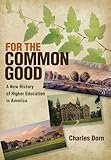For the common good : a new history of higher education in America / Charles Dorn.
Material type: TextPublication details: Ithaca : Cornell University Press, (c)2017.Description: 1 online resource (x, 308 pages) : illustrationsContent type:
TextPublication details: Ithaca : Cornell University Press, (c)2017.Description: 1 online resource (x, 308 pages) : illustrationsContent type: - text
- computer
- online resource
- 9781501712616
- LA226 .F678 2017
- COPYRIGHT NOT covered - Click this link to request copyright permission: https://lib.ciu.edu/copyright-request-form
| Item type | Current library | Collection | Call number | URL | Status | Date due | Barcode | |
|---|---|---|---|---|---|---|---|---|
 Online Book (LOGIN USING YOUR MY CIU LOGIN AND PASSWORD)
Online Book (LOGIN USING YOUR MY CIU LOGIN AND PASSWORD)
|
G. Allen Fleece Library ONLINE | Non-fiction | LA226 (Browse shelf(Opens below)) | Link to resource | Available | ocn964353432 |
Are colleges and universities in a period of unprecedented disruption? Is a bachelor's degree still worth the investment? Are the humanities coming to an end? What, exactly, is higher education good for? In For the Common Good, Charles Dorn challenges the rhetoric of America's so-called crisis in higher education by investigating two centuries of college and university history. From the community college to the elite research university--in states from California to Maine--Dorn engages a fundamental question confronted by higher education institutions ever since the nation's founding: Do colleges and universities contribute to the common good? Tracking changes in the prevailing social ethos between the late eighteenth and early twenty-first centuries, Dorn illustrates the ways in which civic-mindedness, practicality, commercialism, and affluence influenced higher education's dedication to the public good. Each ethos, long a part of American history and tradition, came to predominate over the others during one of the four chronological periods examined in the book, informing the character of institutional debates and telling the definitive story of its time. For the Common Good demonstrates how two hundred years of political, economic, and social change prompted transformation among colleges and universities--including the establishment of entirely new kinds of institutions--and refashioned higher education in the United States over time in essential and often vibrant ways. --
Includes bibliographies and index.
Literary institutions are founded and endowed for the common good : the liberal professions in New England -- The good order and the harmony of the whole community : public higher learning in the South -- To promote more effectually the grand interests of society : Catholic higher education in the Mid-Atlantic -- To spread throughout the land, an army of practical men : agriculture and mechanics in the Midwest -- The instruction necessary to the practical duties of the profession : teacher education in the West -- To qualify its students for personal success : the rise of the university in the West -- This is to be our profession, to serve the world : women's higher education in New England -- The burden of his ambition is to achieve a distinguished career : African-American higher education in the Mid-Atlantic -- A wedding ceremony between industry and the university : the urban university in the Southeast -- To meet the training and retraining needs of established business : community colleges in the Northeast and Southwest.
COPYRIGHT NOT covered - Click this link to request copyright permission:
There are no comments on this title.
